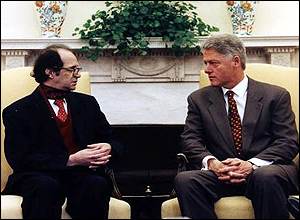 “We take this opportunity once again to call for the formal recognition of the independence of Kosovo as soon as possible,” Rugova said.
“We take this opportunity once again to call for the formal recognition of the independence of Kosovo as soon as possible,” Rugova said.
Moderate ethnic Albanian leader Ibrahim Rugova has claimed victory in Kosovo’s historic election and is calling for the province to be now recognised as an independent state.
Official results are due on Monday, but Rugova said his Democratic League of Kosovo had clearly won a mandate to form a government.
“We take this opportunity once again to call for the formal recognition of the independence of Kosovo as soon as possible,” Rugova said.
Moderate ethnic Albanian leader Ibrahim Rugova has claimed victory in Kosovo’s historic election and is calling for the province to be now recognised as an independent state.
Official results are due on Monday, but Rugova said his Democratic League of Kosovo had clearly won a mandate to form a government.
“We take this opportunity once again to call for the formal recognition of the independence of Kosovo as soon as possible,” Rugova said.
Politically, the two leaders stand at opposite ends as Rugova clearly wants Kosovo to become independent, while Kostunica will never agree to even discuss the issue of Kosovo’s sovereignty.
The two leaders also appear not ready yet to begin a dialogue on a possible third way — not least because this third way solution already exists in the form of the United Nation’s International Protectorate in Kosovo.
President Kostunica, speaking in a recent interview with CNN, said that, for the moment, having an international presence in Kosovo is the best solution.
Any changes to the status quo, he added, would have to be linked to the return of Kosovo Serbs expelled from the province after NATO and the UN took control of the province last year.
The international community is now making giant steps to welcome Yugoslavia back into the family of nations, and Kostunica is in many ways now perceived to be the great saviour of the Balkans.
This leaves Rugova with the big problem of how to continue the struggle for Kosovo’s independence.
Without a clear enemy in Belgrade — as former President Slobodan Milosevic used to be — Kosovo’s hopes for independence are fading away, if they have not disappeared all together.
The international community, which is now administering the Kosovo entity, no longer supports the notion that Kosovo could eventually become independent.
Western leaders never openly admitted that, but many of them considered it more than just an eventuality if Milosevic had remained in power.
Although most people in Kosovo want independence — including both moderate and hardline politicians — there are deep divisions on how that aim can be achieved.
Rugova is known to be a moderate, and a man capable of waiting. He has fought a long and peaceful struggle against the Serbian regime, with a sort of passive resistance.















